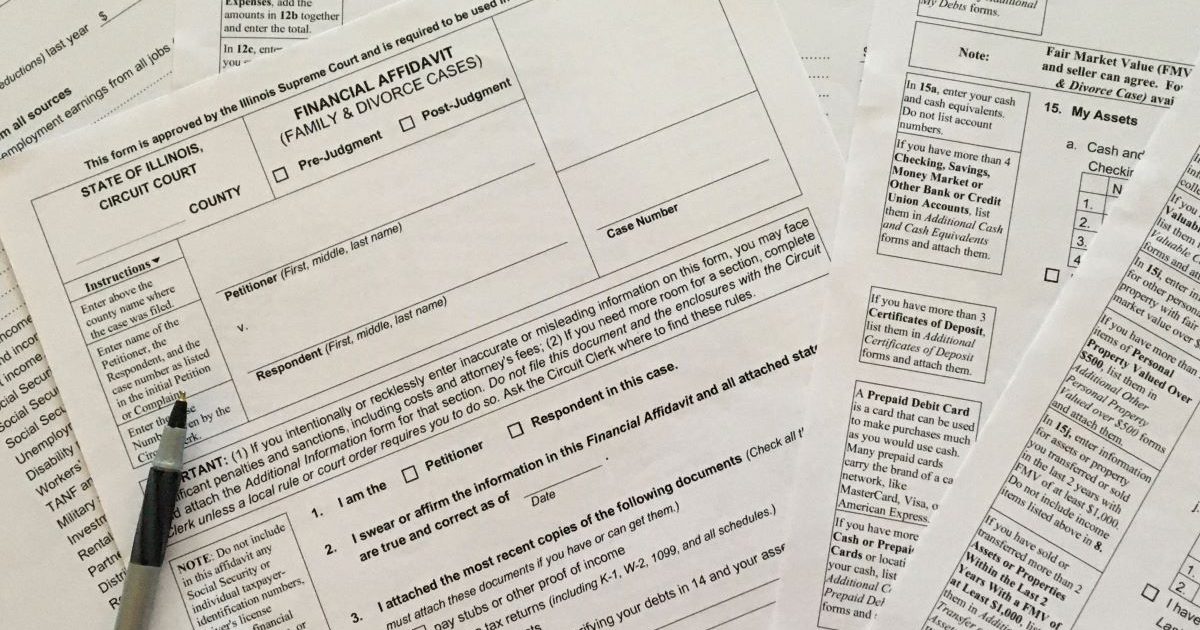Getting divorced requires full and accurate disclosure of each party’s financial information. In Illinois, we use the Financial Affidavit form for divorce approved by the Illinois Supreme Court to summarize and share information. Each person, when they sign their Financial Affidavit, affirms that all information provided is true and correct.
At first glance, this multi-page form can be intimidating. In this article, we look at the types of information collected in the Financial Affidavit and how the information is used. The four categories of information requested – in order of importance – are:
- General information
- Assets and debts
- Income
- Expenses
Understanding the Categories of Information Requested
The Financial Affidavit categories have different purposes throughout the divorce process.
General Information
These questions are simple and straightforward (e.g., date of birth, date of marriage). Much of the information requested in the Financial Affidavit is used to complete other legal documents during the divorce. If any fields are left blank, additional attorney fees may be incurred to fill in the missing pieces. (General information is collected in Sections 1 through 5, 13, and 17 of the Financial Affidavit.)
Assets and Debts
In every divorce case, the Court needs to see a listing of all assets and debts and how they are allocated between the parties. Even in cases where the parties say, “I keep mine. You keep yours.” the Court still needs to look at the numbers to determine that the overall settlement is “not unconscionable”. This means that the settlement does not favor one spouse over the other to such a degree that no one would ever willingly agree to the terms. If a person omits or misrepresents a value, that person is committing perjury. (Reference Sections 14 through 16 of the Financial Affidavit.)
Income
Both parties must disclose all sources of income and amounts received in the current year and the recent past. The income sections are extremely important if maintenance is at issue and/or there are minor children. (Reference Sections 6 through 9 in the Financial Affidavit.) The Illinois Financial Affidavit released in June 2021 includes specific questions that go into more detail for self-employed people.
Expenses
The expense part of the form causes the most consternation for people filling it out. Here is why: In all cases, a family’s past expenses will be different from their expenses after the divorce. Knowing exactly how expenses will be different is hard to pinpoint when living arrangements are still being worked out. We explain to our clients that there is no “right” answer when it comes to expenses.
In our office, we are looking for a well thought out estimate. For example, the Affidavit states, “In 12a, enter the amount your household spends on each item each month,” and one of the line items is “Groceries, household supplies and toiletries.” One approach is to use an historical number (when all family members were under one roof). Another approach is to report what they anticipate the number to be based on their new living arrangement. If you are using an estimated expense value be sure to clearly indicate this. When a person indicates they are using an estimated value, it is unlikely they can be accused of committing perjury by misstating an expense. Depending on the approach your attorney is taking, they may want you to present an “historical number” or a “future-focused estimate.” So, if you are filling this section out and are not clear, ask your attorney.
At Trinity Family Law, we generally start our clients off looking at the past because it provides a context. Then, because in a non-adversarial process we are future-focused, we help our clients develop realistic estimates of future expenses in order to generate a settlement that is sustainable for everyone. (Reference Sections 12 and 13 in the Financial Affidavit.)
If both people have jobs that cover their individual expenses and neither is seeking maintenance from the other (and there are no minor children), the expense portion of the Financial Affidavit is irrelevant.
If there are children (minor and/or non-minor) where expenses are shared (e.g., education, health-related), the children’s expense portion of the Affidavit needs to be completed. (Reference Section 12d of the Financial Affidavit.)
Using the Financial Affidavit
Depending on the process a couple uses – non-adversarial or litigated – the Financial Affidavit can be a tool or a weapon.
At Trinity Family Law, we take a non-adversarial approach to divorce. In this paradigm, we consider the Financial Affidavit to be a tool to help both people get fully educated about the family’s net worth and cashflow. This allows them to make informed decisions about the future. Prior to the divorce, perhaps one spouse was responsible for the day-to-day financial duties in a household (e.g., paying bills, balancing the checkbook, reviewing account statements), and the other spouse managed investments. Working through the Financial Affidavit allows both spouses to get up to speed and work from a common set of facts. The goal is a sustainable, equitable settlement where everyone can move forward and where the people impacted, not the judge, make the decisions.
In contested litigation, the Financial Affidavit can be used as a weapon. One person may use it to argue that the other is lying or unreasonable. Someone else may try to hide assets or inflate expenses to support a demand for higher support payments. If you are in a “win-lose” paradigm, the information can be massaged to paint the picture you want.
The Takeaway
First, choose the divorce process that works for your situation. Then, whether the goal is settlement or winning in Court, both people will eventually need to testify under oath that they made full and accurate disclosure of all their income, assets and debts. If your attorney directs you to execute a Financial Affidavit, you are stating under oath that the information is correct.
In a non-adversarial process, focus on providing accurate numbers for the assets, debts, and income. Do your best with expenses and indicate when you are using an estimate for an expense. No one is likely to challenge you on the numbers you write down for expenses. If there are minor children and both parties are contributing to extra-curricular expenses, it is best to have a fairly accurate number of what those expenses are for planning purposes. This will require looking at past expenses and projecting into the future, maybe even making phone calls to extra-curricular providers. Other expenses, like out-of-pocket medical, are more difficult to estimate for the future. Do your best with what you know. For example, if you are on allergy medicine, start there.
Consider the process of completing the Financial Affidavit as an opportunity to become better informed of how your family spent money in the past so you can make more informed choices going forward. Avoid the temptation to tell your spouse what they should do. We tell our clients to “stay in their lane.” Focus on your own income and expenses. Then, think through the changes you want to make as you prepare for your future in light of your goals and values.



